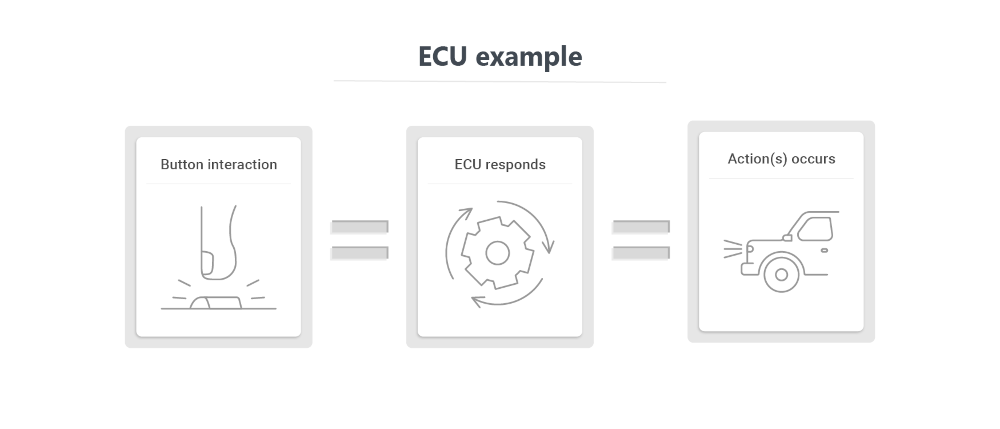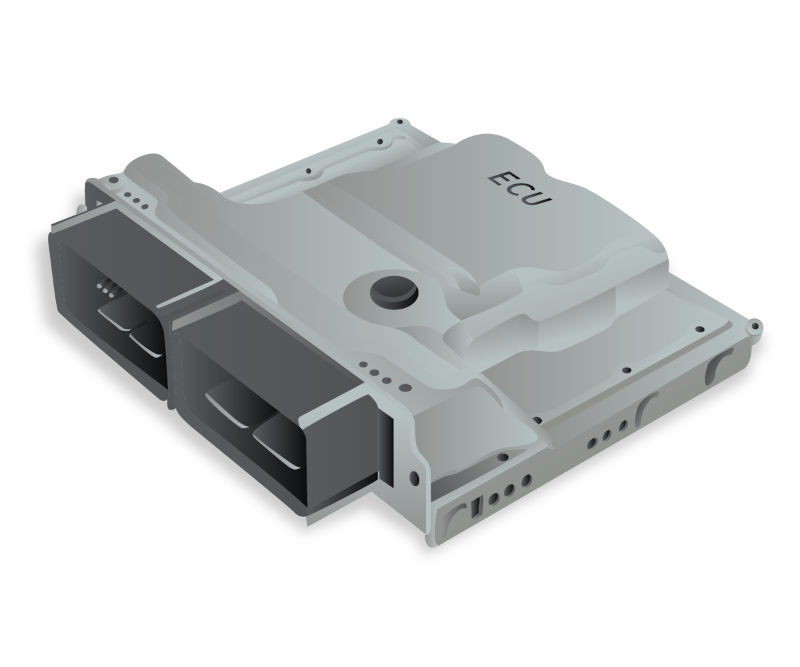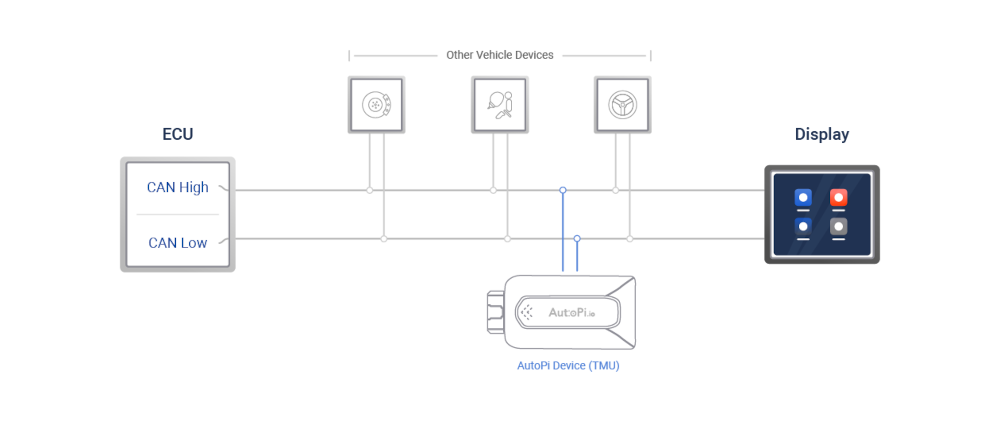Ever wondered what keeps all the electronic systems in your car working together so smoothly?
The answer lies in something called Electronic Control Units, or ECUs. These little computers are like the brains of your car, making sure everything works right.
I'm the Digital Marketing Manager at AutoPi, and I’ve spent a lot of time digging through articles, blogs, and posts about automotive technology to bring you the most accurate and reliable information. But I’m not doing this alone. Henrik, our brilliant CTO at AutoPi, is here to help guide us through this technical journey.
In this guide, we’ll explore what an ECU is, why it’s so important, how to spot issues, and much more.
Ready to dive in? Let’s get started!

What is an ECU in a Car?
An Electronic Control Unit (ECU) is a small but powerful computer inside your car. These units are responsible for controlling various electrical systems and subsystems, making sure your vehicle runs smoothly and efficiently.
While the Engine Control Unit is one type of ECU, managing engine performance, there are many other ECUs in a modern car. They handle everything from window controls to airbags to the infotainment system.
They gather information from various sensors—like those for oxygen, temperature, and pressure—and use this data to make real-time adjustments. This coordination ensures your engine runs efficiently, your safety systems respond quickly, and your car’s climate control and entertainment features work seamlessly.
Without these ECUs, modern cars wouldn’t be able to perform at their best. They help improve fuel economy, reduce emissions, and provide a smoother driving experience. In fact, most new vehicles have up to 80 different ECUs, each playing a crucial role in keeping everything running perfectly.
You might also hear terms like Engine Control Module (ECM) and Electronic Control Module (ECM). These are often used interchangeably with ECU but essentially refer to the same concept of managing various electronic systems in your vehicle.
How an ECU Works
Let’s get into the nuts and bolts of how an ECU actually works. At its core, an ECU processes information from various parts of your car and makes real-time decisions to keep everything running smoothly.
First off, the ECU gathers data from numerous sensors located throughout the vehicle. These sensors monitor things like engine temperature, air pressure, oxygen levels, and many other parameters. Think of them as the car’s sensory organs, constantly sending information to the ECU.
Once the ECU receives this data, it processes it using pre-programmed instructions and algorithms. Based on the information, the ECU sends commands to various actuators. These actuators are like the muscles of your car—they carry out the actions that the ECU decides on.
-
For example, if the sensors detect that the engine is getting too hot, the ECU might activate the cooling fan or adjust the fuel mixture to help cool it down.
Let’s look at a common scenario: adjusting fuel injection. When you press down on the gas pedal, sensors detect the increased demand for power. The ECU processes this information and sends a precise command to the fuel injectors to release the right amount of fuel into the engine. This ensures optimal performance and fuel efficiency, all happening in a fraction of a second.

By constantly monitoring and adjusting, the ECU ensures that your car operates efficiently, performs well, and stays safe. It’s an incredibly sophisticated system working behind the scenes to give you a seamless driving experience.
To better understand this process, here’s a step-by-step breakdown:
|
Step
|
Action
|
Description
|
|---|---|---|
| 1 | Sensors Collect Data | Sensors throughout the car monitor various parameters (e.g., temperature, pressure, oxygen levels). |
| 2 | Data Sent to ECU | The sensors send real-time data to the ECU. |
| 3 | ECU Processes Data | The ECU processes the information using pre-programmed instructions and algorithms. |
| 4 | ECU Sends Commands | Based on the processed data, the ECU sends commands to the relevant actuators. |
| 5 | Actuators Perform Actions | Actuators carry out the commands (e.g., adjusting fuel injection, activating the cooling fan). |
| 6 | Continuous Monitoring and Adjusting | The ECU continuously monitors the sensors and makes real-time adjustments as needed. |
To better understand this process, imagine a conductor leading an orchestra. The sensors are the musicians playing their instruments, the ECU is the conductor interpreting the music, and the actuators are the sound produced, bringing the conductor's vision to life.
Signs Your Car’s ECU Might be Failing
Knowing the signs of a failing ECU can save you a lot of headaches down the road. Here are some signs that your car's ECU might be having problems:
-
Car Won’t Start: One of the most obvious signs of a faulty ECU is when your car struggles to start or doesn’t start at all. The ECU plays a crucial role in managing the engine start-up process. If it's not functioning correctly, it can prevent the engine from firing up.
-
Check Engine Light is On: The Check Engine light on your dashboard is a catch-all for many issues, but a malfunctioning ECU is one of the potential culprits. If this light comes on and stays on, it’s worth getting your ECU checked.
-
Engine Misfires or Stalls: If your engine misfires, stalls, or exhibits unpredictable behavior, it could be a sign that the ECU isn’t regulating the engine functions properly. These issues can affect your car’s performance and reliability.
When your car won’t start, it can be due to the ECU failing to manage the ignition or fuel injection systems properly. This can leave you stranded, as the engine simply won’t get the necessary signals to operate.
The Check Engine light is like your car’s way of telling you something’s wrong, but it doesn’t specify what. A faulty ECU might trigger this light because it’s not processing sensor data correctly, causing the engine to run outside normal parameters.
Engine misfires or stalls happen when the ECU fails to maintain the correct air-fuel mixture or timing. This can lead to rough idling, jerking, or complete stalling of the engine, making your drive far from smooth.
At AutoPi, we’ve seen a variety of issues caused by failing ECUs in our clients’ vehicles. Some of the most common failures include:
-
Erratic Performance: Clients have reported inconsistent engine performance, often feeling like the car is losing power unexpectedly.
-
Fuel Efficiency Drops: A failing ECU can lead to poor fuel management, resulting in significantly lower miles per gallon.
-
Emission Problems: Several clients experienced failed emissions tests due to the ECU not properly regulating the engine’s emissions control systems.
These real-world examples highlight the importance of addressing ECU issues promptly. Regular diagnostics and maintenance can help catch these problems early, saving you from more severe and costly repairs down the line.
Causes and Effects of ECU Failure
Understanding what happens when an ECU fails and why it fails can save you from a lot of headaches and expenses down the road. Let’s dive into the causes and effects of ECU failure and how you can prevent these issues.
Vehicle Performance Effects
When an ECU fails, you’ll likely notice it right away. Your car might start acting up with symptoms like stalling, misfiring, or even refusing to start. These issues can make driving your car a frustrating experience and, if ignored, can lead to bigger problems.
In the long run, a failing ECU can cause serious damage. Continuous poor vehicle performance can wear out engine components faster, leading to expensive repairs or even complete engine failure. Plus, a malfunctioning ECU can hurt your wallet by reducing fuel efficiency, making you spend more on gas.
Risks and Safety Issues
A faulty ECU isn't just an annoyance—it can be a safety hazard. Imagine your car suddenly losing power or the engine stalling in the middle of traffic. These scenarios can be dangerous. Moreover, critical systems like airbags or anti-lock brakes might not work properly if their respective ECUs are compromised, putting you and your passengers at risk.
Costs of a Failing ECU
Dealing with a failing ECU can get expensive. Initially, you'll face costs for diagnostics and minor repairs. But if the ECU needs replacing, it can set you back anywhere from $300 to over $1,000, depending on your car’s make and model.
Industry reports highlight that regular maintenance can significantly reduce the risk of major ECU-related repairs. Staying on top of your car's health can save you a lot in the long run—up to 50% on potential repair costs, according to some studies.

Causes of ECU Failure
Several factors can lead to ECU failure:
-
Water Damage: Moisture can corrode the internal components of the ECU, causing it to fail.
-
Electrical Issues: Power surges, shorts, or faulty wiring can fry the ECU’s circuits.
-
Overheating: Excessive heat, especially if the ECU is near hot engine parts, can cause it to overheat and malfunction.
-
Wear and Tear: Over time, constant use and environmental stress can degrade the ECU.
How to Prevent ECU Failure
Here are some practical steps to keep your ECU in good shape:
-
Regular Maintenance: Regularly check your car’s electrical systems to prevent issues like shorts and surges.
-
Protect from Moisture: Ensure your ECU is properly sealed and protected from water damage.
-
Monitor Heat Levels: Keep an eye on your engine temperature and make sure the cooling system is working well.
-
Professional Inspections: Have your car inspected by professionals regularly to catch potential problems early.
At AutoPi, we’ve seen how these preventative measures can save our clients from costly repairs. One client experienced frequent engine stalling. We found the ECU was exposed to moisture due to a faulty seal. Fixing the seal and replacing the ECU solved the problem, and the car’s performance improved dramatically.
Another client’s car had poor fuel efficiency. Our diagnostics revealed the ECU was overheating. By relocating the ECU to a cooler spot and improving ventilation, we boosted the car's fuel economy significantly.
Troubleshooting and Replacing Your ECU Car Part
When your car acts up, and you see that dreaded Check Engine light, it’s easy to feel overwhelmed. But don't worry, understanding how to troubleshoot ECU issues and knowing when to replace your ECU can save you time, money, and a lot of stress. Let's break this down step-by-step.
Understanding ECU Error Codes
When that Check Engine light comes on, it’s your car’s way of telling you something is wrong. The ECU stores error codes that help pinpoint the issue. Here are some common ones:
-
P0171: System Too Lean (Bank 1) — Your engine is getting too much air or not enough fuel.
-
P0300: Random/Multiple Cylinder Misfire Detected — Multiple cylinders are misfiring.
-
P0420: Catalyst System Efficiency Below Threshold — There’s likely an issue with your catalytic converter.
To dive deeper into reading these codes, you can check out our comprehensive guide on reading OBD2 codes.
Reading and Interpreting Error Codes
Using an OBD2 scanner can seem tricky, but it’s simpler than you might think. Here’s a quick run-through:
-
Get an OBD-II Scanner: This tool reads the error codes from your car’s ECU.
-
Plug in the Scanner: Find the OBD-II port, usually under the dashboard, and connect the scanner.
-
Retrieve the Codes: Turn on your car and follow the scanner’s instructions to get the error codes.
-
Look Up the Codes: Use the scanner’s manual or an online database to understand what each code means.
For a step-by-step guide on using an OBD2 scanner, see our guide on using an OBD2 scanner.
While it’s great to fix minor issues on your own, sometimes you need a pro. Here’s when to call a mechanic:
-
The error code points to a serious problem, like an engine misfire or catalytic converter issue.
-
You’re not sure how to fix the problem after reading the code.
-
The Check Engine light stays on even after you’ve tried to fix the issue.
Replacing Your ECU
If you need to replace your ECU, here’s a simplified overview of the process:
-
Diagnosis: Confirm the ECU needs replacing through thorough diagnostics.
-
Disconnect the Battery: This is crucial to avoid shocks or shorts.
-
Remove the Old ECU: It’s usually in the engine bay or under the dashboard. Carefully disconnect all wires and bolts.
-
Install the New ECU: Connect the new ECU, making sure all wires are correctly attached, and secure it with bolts.
-
Reconnect the Battery: Then, test the new ECU to make sure everything works.
Cost of Replacing an ECU
Replacing an ECU can be pricey. You might spend between $300 and $1,000, depending on your vehicle’s make and model. This includes the new ECU and labor costs.
Disclaimer
While this guide provides a basic overview of troubleshooting and replacing an ECU, it is always better to seek professional help. Working on your car’s ECU involves handling delicate and complex components, and mistakes can lead to further damage. Only attempt these tasks if you are confident in your abilities and have a solid understanding of automotive electronics.
Finding a Reliable Mechanic
Finding the right mechanic can make all the difference. Here are some tips:
-
Check Certifications: Look for ASE-certified mechanics.
-
Read Reviews: See what other customers have to say online.
-
Ask for Recommendations: Friends and family can often point you to a trustworthy mechanic.
-
Get Multiple Quotes: Don’t settle for the first price; shop around to get the best deal.
For a list of reliable repair shops, simply search 'certified service centers near me.' You'll find trusted options nearby.

Conclusion
The ECU is a crucial component of your vehicle, acting as the brain that keeps everything running smoothly. From managing engine performance to ensuring safety features operate correctly, the ECU plays an essential role in modern cars. Understanding how to troubleshoot and replace an ECU can empower you to take better care of your vehicle and address issues promptly.
Regular maintenance and professional check-ups are vital in keeping your ECU and other car components in top condition. Routine diagnostics can catch potential problems early, saving you time, money, and the hassle of unexpected breakdowns.
Additional Reading
To further your understanding, check out these related articles:
If you have any questions or want to share your experiences with ECU issues, we’d love to hear from you.
For more detailed information or personalized assistance, don’t hesitate to reach out to us. You can contact our team at AutoPi for expert advice and support.




